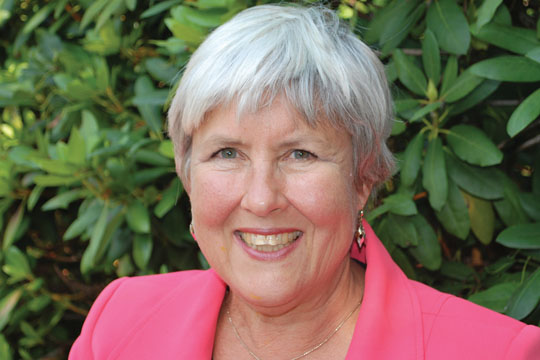
Leslie Gaudette, a volunteer advocacy program officer for the National Association of Federal Retirees, knew from the experience of family members the importance of having powers of attorney for health and finances in place.
It didn’t take long for Leslie Gaudette to grasp the importance of legally designating people she trusts to make financial and health-care decisions on her behalf should she become incapacitated, thanks to the pre-retirement seminars she attended. The experience of family members demonstrated how significant powers of attorney could be and the importance of keeping them current.
“It's something you really need to look at about every five years to make sure you're keeping it updated because people's circumstances change,” says Gaudette, a volunteer advocacy program officer for the National Association of Federal Retirees, who had worked in Ontario and is now living in Langley, B.C., where she grew up.
Gaudette’s own approach was informed by an extended family member who had become incapacitated and whose husband then took responsibility for her affairs following her instructions through her power of attorney. But when he, too, became incapacitated, there was some question about who would then make the necessary decisions on the woman’s behalf and what role her children, from her first marriage, would play. Gaudette’s observations drove home the importance of ensuring the right approach is adopted in the creation of those documents.
While the legislation differs in each province, designating someone to control your property and finances is identified by one document generally referred to as a power of attorney. The provinces differ on how they refer to the designation over health and personal care. In Ontario, both are called a power of attorney. In Nova Scotia, a “personal care directive” is used for health-related decisions, while British Columbia uses a “representation agreement.”
The provinces also differ on whether the person named to take on that responsibility ought to be notified. It’s a requirement in B.C., but not in Ontario or Nova Scotia, for instance. And education for the appointed person isn’t always a requirement. “In B.C., legislation requires the person you want to appoint to consent in writing and they will also review certain information that will explain what their role will be,” explains Halifax lawyer Jonathan Hooper.
A significant difference between the personal care and property documents is that the person assigned to make decisions for personal and health care is only asked to step in upon the incapacity of the individual who signed the document, whereas the power of attorney overseeing the designation of financial control kicks in immediately — even when the person is still of sound mind — which many observers say leaves it open to abuse.

Having a legal plan for who makes decisions about your health and finances is as important as a will — and many people don’t have them.
The power of attorney requires that the designated person act only in the person’s best interest and they could be found to be in breach of that duty and made to pay back money if it’s deemed to have been taken for their own personal gain, says Hooper. Therefore, he adds, selecting the right person to make those financial decisions ought to be carefully considered. It’s helpful if they’re local, have some financial acumen and are trustworthy. And adding a clause specifying exactly when it kicks in is also highly advisable.
The Advocacy Centre for the Elderly is a legal aid clinic in Toronto that fields 4,000 calls annually about legal concerns involving seniors. Just about every day, says executive director Graham Webb, there’s at least one call about problems or abuse related to a power of attorney and they are often quite tricky. “Like a marriage, it's easier to get into than out of,” he says.
He points out that the power of attorney for personal care is designed to take place in the future, if the individual loses the ability to make decisions on his or her own. But the power of attorney for property gives that person immediate access to bank accounts, investments, real estate, insurance and anything else to do with money.
“It's one method of substitute decision making if someone should lose mental capacity. The thing that comes back to bite a lot of people is when you sign a power of attorney for property it takes effect as soon as it’s signed, unless the document says otherwise, and it gives the person named in the document your legal authority to do anything you can do in respect to your own property,” says Webb, who believes that they have been used as a licence to steal. “These are really powerful documents.”
Webb’s centre becomes involved when a rogue attorney has effectively stolen an older adult's assets, sold or mortgaged their house or cashed in their insurance and litigation becomes necessary to recoup any lost funds. But sometimes, he says, it’s like trying to put Humpty Dumpty back together; nothing is quite the same.
The saddest part for forensic accountant Lisa Majeau Gordon, an Edmonton-based partner with the Canadian national accounting and business advisory firm MNP LLP, is not simply the abuse of trust, but the damage these disputes do to family members. She knows too well the problems that can occur with a power of attorney and emphasizes that safeguards are a necessary ingredient. She suggests the best approach begins with ensuring the attorney knows exactly what the role entails. And the best way to keep track of the work they do is to keep meticulous records.
But she also says a trustee, a financial expert, or someone other than a family member be considered for the task. The document can — and should — also spell out specific requirements, such as consulting with an expert, limiting power and restricting the type of investments, sales or purchases.
Majeau Gordon finds these situations occur in the absence of a clear understanding of the requirements of being an attorney. Initially, she adds, there is usually no ill intent, but situations can quickly spiral out of control.
“Sometimes caring for someone who is incapacitated is an exhausting amount of work, and a bit of a thankless job. So, over time, you might find people who help themselves to an estate before they're entitled to it... because they feel they have put in the work,” she says.
But the documents do have limitations, warns Peter Wouters, an Ontario-based tax, retirement and estate-planning specialist for Empire Life, who focuses on aging populations and who frequently makes presentations to seniors. Snowbirds who own property in another country will want to look into what they need to protect that investment should they not be able to handle their own affairs in the future.
“Whatever documents you have up here, may not even work down there,” he says. “Who's going to take care of you, make decisions for you or handle all your property and financial affairs in Florida if you can’t do it?”
In B.C., Gaudette’s own changing circumstances prompted her to update her legal documents at least four times during her life, allowing her to see some of the differences between the provinces. Currently she has her adult children named to represent her for financial and medical purposes in case of incapacitation. “I’m in B.C., I have my children, who live in Ontario, on the medical representation document, and I had to get their signature notarized in Ontario, which was not a requirement in Ontario, but was in B.C.”
For additional information on estate planning, download a digital copy of the You and Your Survivors workbook, presented by the National Association of Federal Retirees and Arbor Memorial.
Safeguarding your power of attorney
Include a condition of delayed effectiveness so the document takes effect at a later date or when certain conditions are met, such as the individual being found to be mentally incapable, which could be done through an assessment of capacity.
State that experts need to be consulted to limit power and restrict the types of investments, sales or purchases.
Don’t give the power of attorney to someone you don’t completely trust.
Name a monitor who would have the legal right to obtain financial information from your power of attorney about your estate.
You might name one of your children to handle the financial duty, and have your sibling, their aunt or uncle, as the monitor.
Name a backup power of attorney.
When there is no power of attorney and making changes
Each province has a procedure for public guardian where there is no power of attorney, to make sure things are handled in a proper manner. The statutory guardian of property can be made to have the legal authority to delegate management of your estate.
The guardian also has the authority to revoke the delegation in situations such as abuse and resume authority over it.
If there is abuse of your estate after you’ve lost mental capacity, someone could step in and apply for a court appointed guardianship, which trumps the powers of attorney for property and personal care in Ontario.

